What Does a Nutritionist Do? Understanding the Education, Credentials, and Benefits

Key Takeaways
Are you curious about what a nutritionist does and what it takes to be able to call yourself one? You might be surprised to learn that in most states, it’s legal for just about anyone to call themselves a nutritionist.
Common Nutritionist Titles
The nutritionist title can capture many different types of training and experience, and not all of them are created equal. For example, you may have seen titles such as:
- Licensed vs unlicensed nutritionists
- Registered dietitians and dietitian nutritionists (RD/RDN)
- Certified nutrition specialists (CNS)
- Certified clinical nutritionists (CCN)
- Certified Diabetes Care and Education Specialist (CDCES)
- Functional nutritionists
That's why it's important to make sure you know who you're getting your nutrition advice from and what type of training your nutrition professional has had. So what do all these titles mean, and what’s the difference between each of these different certifications of nutritionists? Let’s find out.
Dietitian and Certified Nutritionists vs. Nutritionists - What’s the Difference?
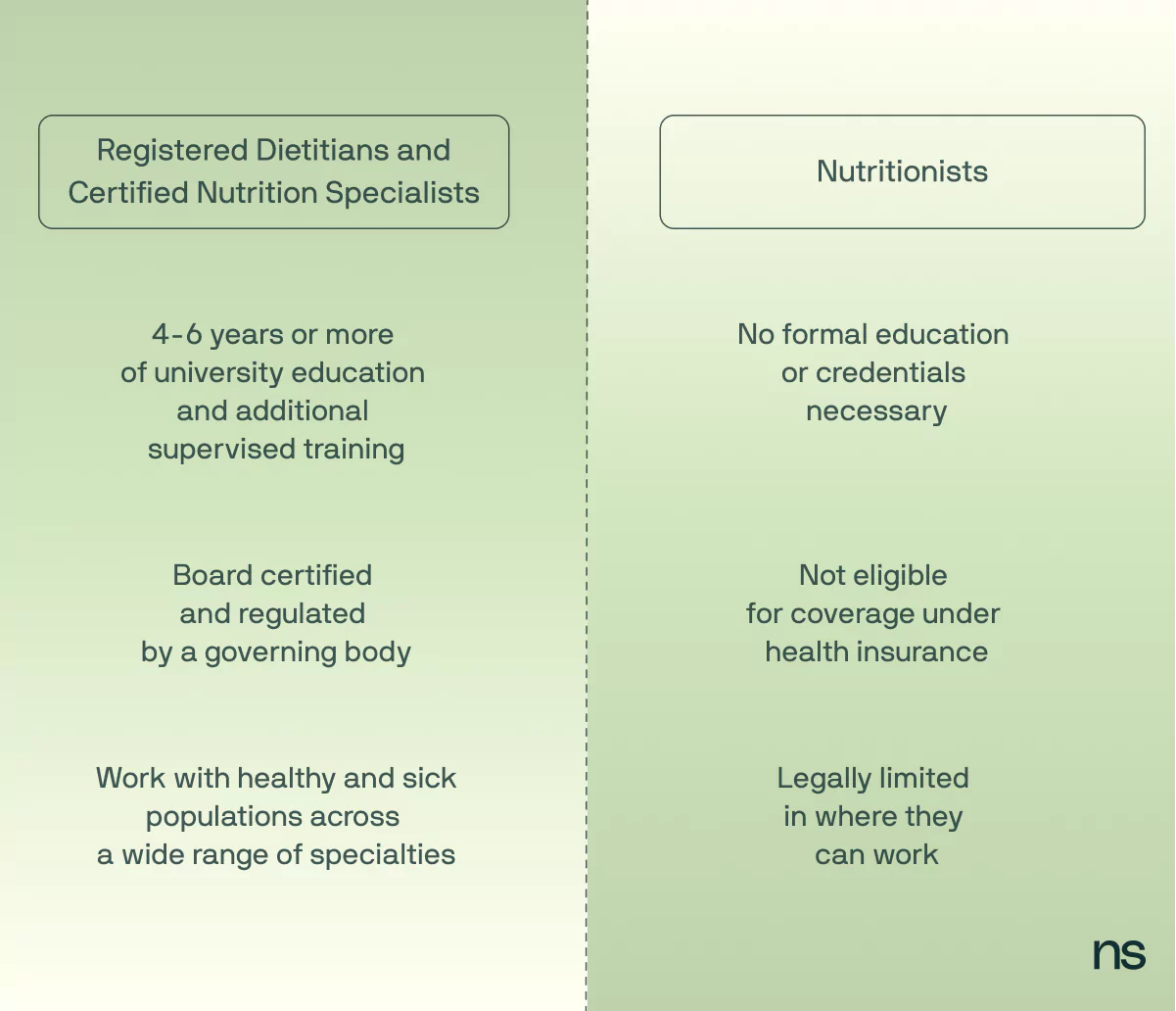
Though many may call themselves a nutritionist in most states, that’s not the case with other credentials, such as registered dietitian nutritionist (RD/RDN) and certified nutrition specialist (CNS). So what’s the difference between these two types of nutritionists?
Registered Dietitian Nutritionist
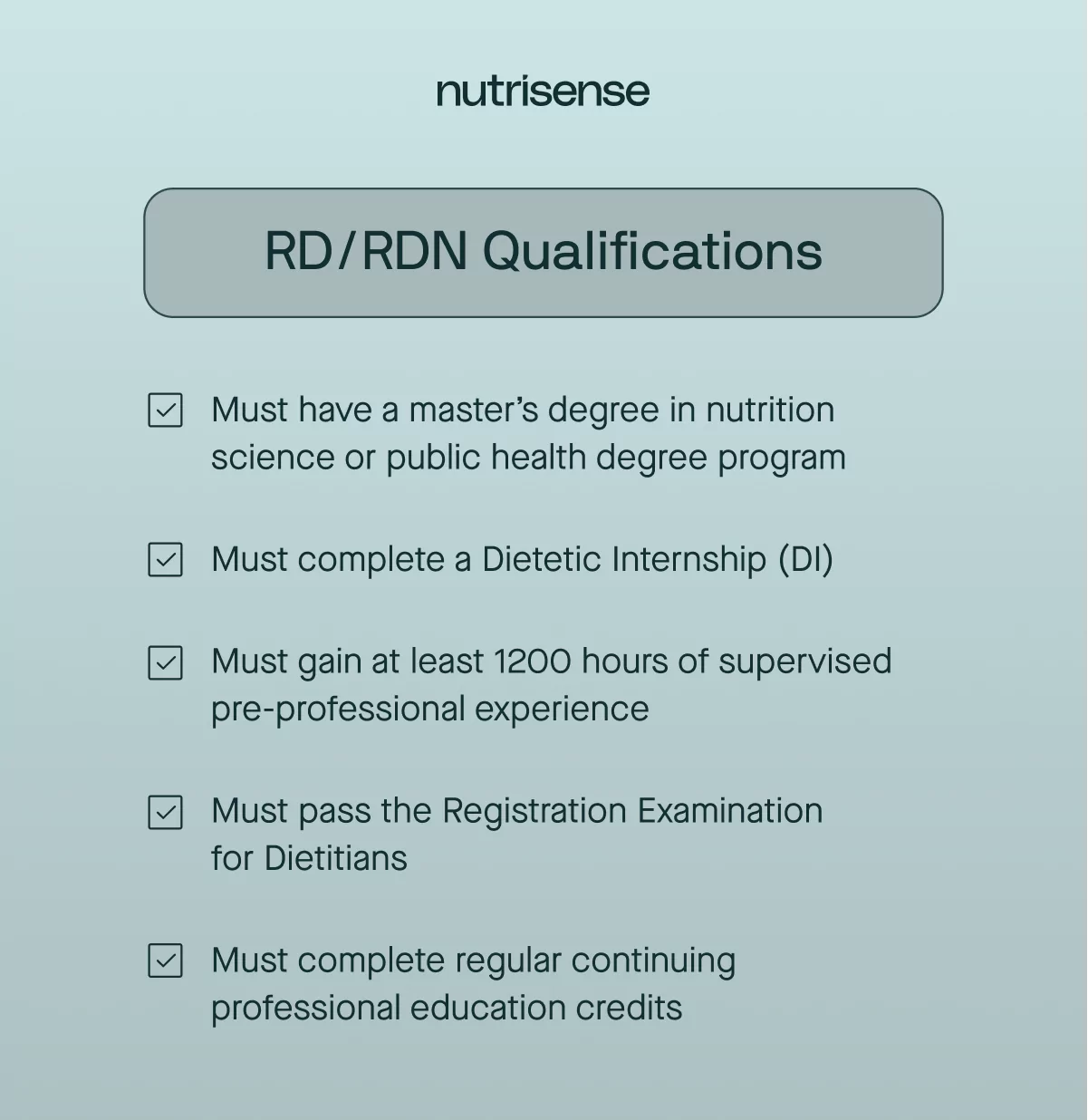
A registered dietitian (RD) or registered dietitian nutritionist (RDN) is a highly trained and qualified nutrition professional. The RD/RDN designation is administered by the Commission on Dietetic Registration, the credentialing agency for the Academy of Nutrition and Dietetics.
It requires completion of a minimum of a master’s degree in nutrition science or a public health degree program with a nutrition focus and a Dietetic Internship (DI), which includes supervised experience. ACEND (Accreditation Council for Education in Nutrition and Dietetics) requires that you gain at least 1200 hours of supervised pre-professional experience as the last step before being eligible to take the Registration Examination for Dietitians.
In order to maintain the RD/RDN credential, dietitians must complete regular continuing professional education credits within a designated number of years.
Certified Nutrition Specialist
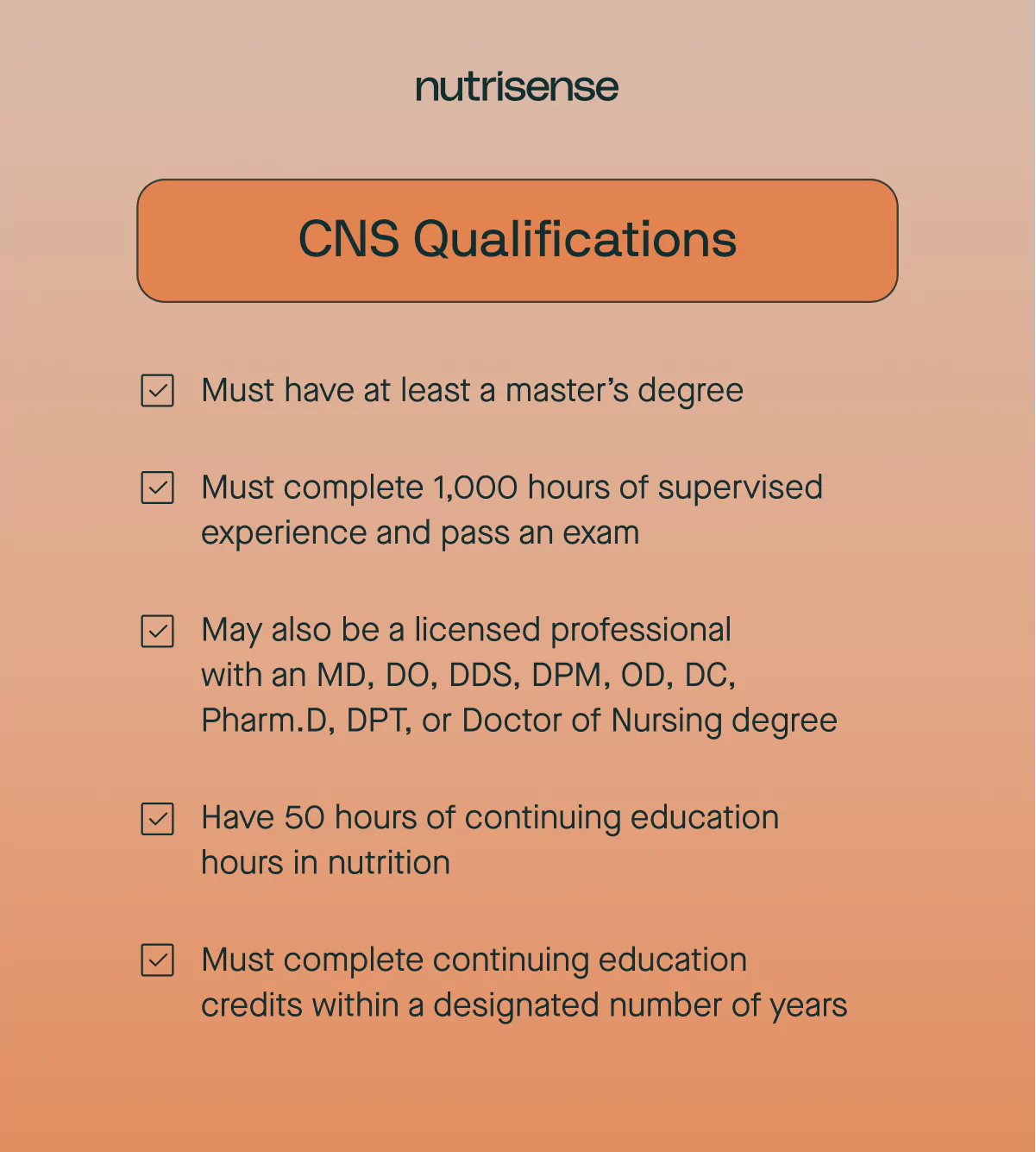
A Certified Nutrition Specialist, or CNS, is another highly qualified and trained nutrition professional. The Certified Nutrition Specialist (CNS) designation is administered by the Board for Certification of Nutrition Specialists (BCNS), the certifying arm of the American Nutrition Association.
Many states accept the CNS credential or exam for licensure purposes. To qualify for the credential, applicants must have at least a master’s degree, complete 1,000 hours of supervised experience, and pass an exam.
To obtain a CNS, you may also be a licensed professional with an MD, DO, DDS, DPM, OD, DC, Pharm.D, DPT, or Doctor of Nursing degree and have 50 hours of continuing education in nutrition, as well as passing the exam.
To maintain the CNS credential, these nutritionists must also complete continuing education credits within a designated number of years.
How To Become A Nutritionist
If you’re thinking of pursuing a nutritionist career path, there are a number of options you may want to consider. If you want to ensure you are eligible to be licensed in your state and have a broader scope of practice, this will narrow the options a bit.
Licensure and Scope
Licensing laws vary by state, but for those licensing nutritionists, registered dietitians (RDs/RDNs), and certified nutrition specialists (CNSs) are two of the most common eligible credentials. Licensing may also allow you to add a deeper clinical scope to your work, including offering customized nutrition or medical nutrition therapy counseling.
Requirements, Title Protection, and Insurance
State regulations shape who can provide nutrition counseling and whether sessions may qualify for insurance reimbursement. In many states, title protection and licensure requirements limit medical nutrition therapy to licensed providers such as RD or RDN and CNS. If you plan to use insurance, confirm the provider’s credentials and check your plan details.
- Title protection and practice: Some states protect titles like dietitian or nutritionist and restrict medical nutrition therapy to licensed practitioners, while others allow broader nutrition education with conditions.
- Licensure requirements: States may require an exam, supervised experience, and approved education. RD or RDN credentials, along with CNS credentials, often meet these licensure standards.
- Insurance reimbursement: Plans frequently recognize services from licensed providers. Coverage varies by state and plan, so verify specifics with your insurer.
For members interested in covered care, you can check eligibility for insurance-covered video calls with a registered dietitian through Nutrisense.
Other Certifications
Not everyone is legally eligible to provide counseling in nutrition or medical nutrition therapy, and having that scope may also allow you to access a wider variety of job opportunities. There are many online programs that allow you to gain a variety of other nutrition credentials. These might include:
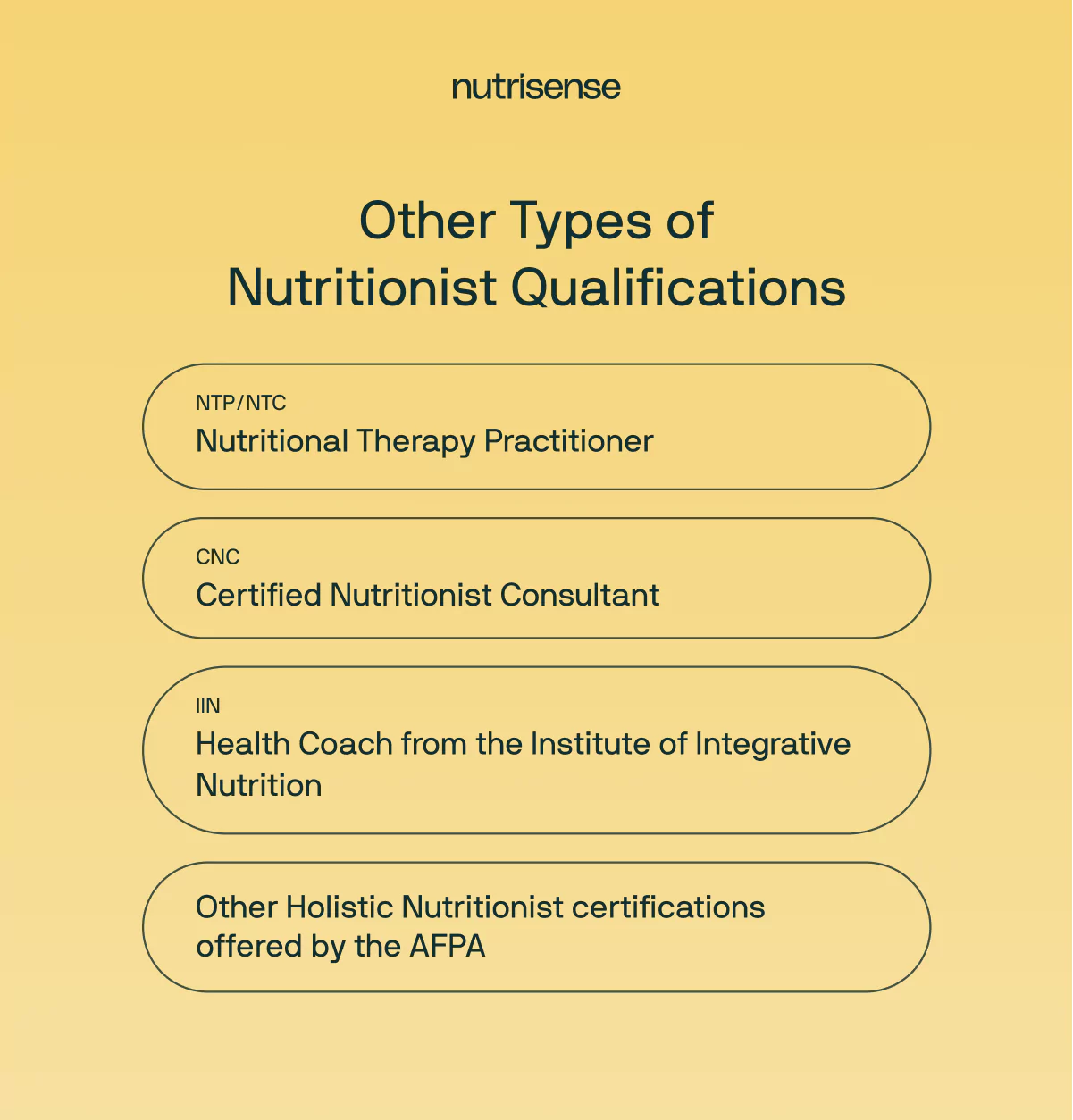
- Nutritional Therapy Practitioner (NTP/NTC)
- Certified Nutritionist Consultant (CNC)
- Health Coach from the Institute of Integrative Nutrition (IIN)
- The AFPA offers a multitude of holistic nutritionist certifications
Unfortunately, none of these credentials listed above will be eligible for licensing nor involve the level of in-depth training in nutrition science and clinical nutrition counseling you might gain from the RD/RDN or CNS pathways, for example.
Where Do Nutritionists Work?
Your scope of practice will dictate a lot about what type of job you will have as a nutritionist. These options may also vary by state. If you are legally able to provide medical nutrition therapy guidance or nutrition counseling, you may find job opportunities in places such as:
- Hospitals and healthcare facilities
- Community and public health settings
- Food service management
- Teaching in schools and universities, including conducting research
- Private practice
Hospitals and Healthcare Facilities

In inpatient or outpatient clinical settings, the scope of practice enabling you to provide medical nutrition therapy is extremely important. Most of these institutions will require a registered dietitian (RD/RDN) credential with training in acute care support, such as enteral or parenteral nutrition.
Community and Public Health Settings
These settings might include organizations such as public schools, Women, Infants, and Children (WIC), or certain non-profit organizations. Depending on the employer, credentials, and work experience, requirements may vary.
Public health nutritionists are focused on understanding and supporting the health and wellbeing of larger populations. Though they may do some one-on-one counseling work as part of their role, they are typically guiding larger groups.
Food Service Management

Nutritionists working in food service management often oversee larger-scale food production and regulation. This might be within a hospital setting, community setting, or other organization.
Mastery of state and federal food policies, manufacturing practices, and distribution is important. Many of these nutritionists might have additional culinary expertise, and often an RD/RDN credential is required. The types of credentials required for these roles depend on the state and employer.
Education and Research
As a nutritionist with an advanced level of education, such as a master’s or doctoral degree in nutrition science or public health, you may also have the opportunity to teach or conduct research at a variety of institutions.
Private Practice
State regulations related to who can practice nutrition in private practice may be lenient in some cases, depending on what services you provide. This can include services as a sports nutritionist, a nutritional consultant, or working as a clinical nutritionist.
If you are providing assessments, customized nutrition programs, meal plans, or personalized nutrition counseling, you’ll need to make sure you have the proper credentials, which might include an RD/RDN or CNS.
What are the Benefits of Working With an RD or CNS?
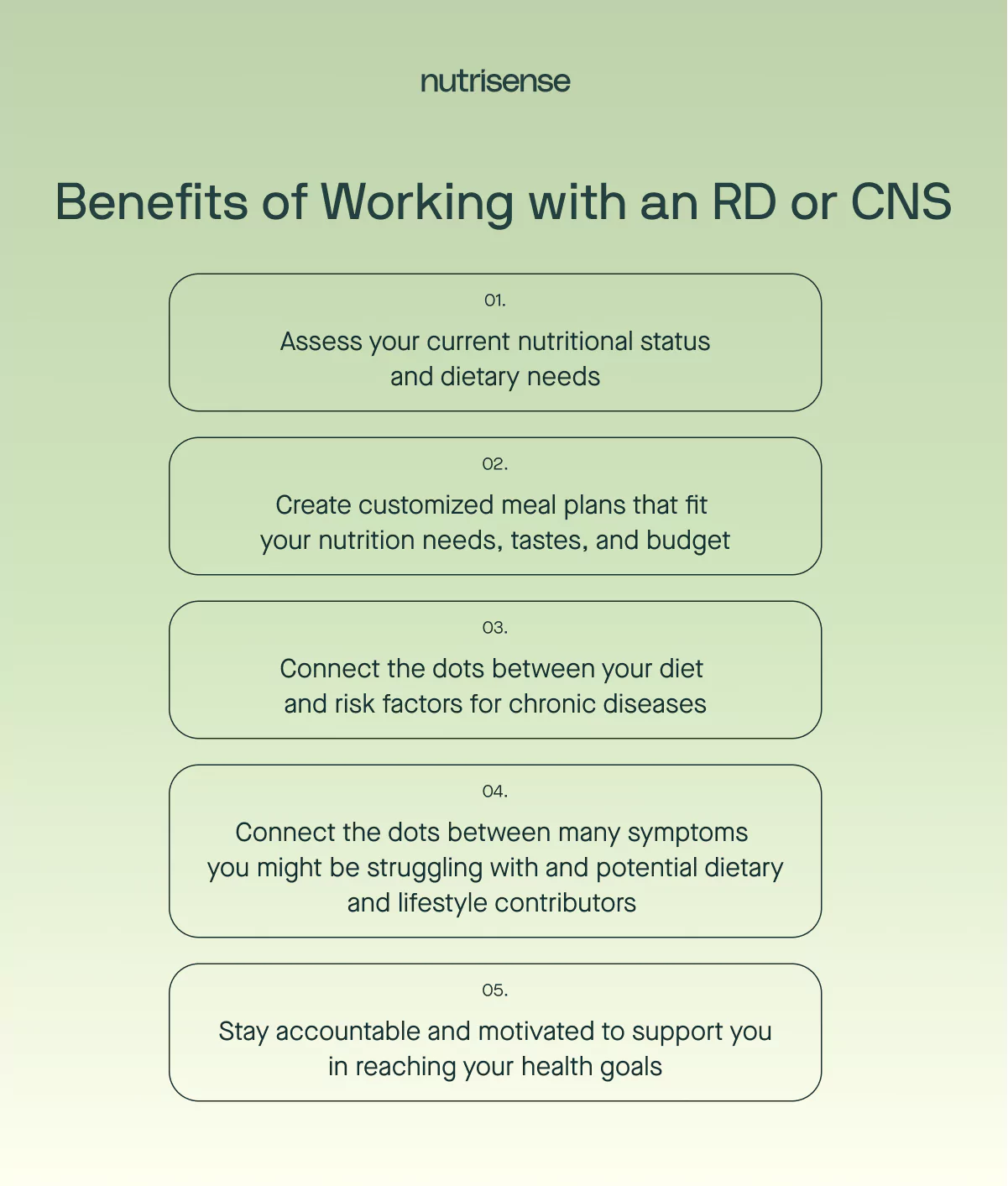
How can consulting a nutritionist benefit you? Nutritionists with the proper training and credentials can help you:
- Assess your current nutritional status and dietary needs
- Create customized meal plans that fit your nutrition needs, tastes, and budget
- Connect the dots between your diet and risk factors for chronic diseases
- Connect the dots between many symptoms you might be struggling with and potential dietary and lifestyle contributors
- Stay accountable and motivated to support you in reaching your health goals
From Conflicting Advice to a Clear Plan
You’re scrolling online and see one influencer say oatmeal is the perfect breakfast, while another claims it’s a glucose disaster. You’ve tried following all the popular advice, but the scale won’t budge, and you still feel tired by 3 p.m.
The frustration is real. You're ready to stop guessing and work with a qualified expert who can analyze your body's data and give you a straight, personalized answer that finally works.
If you are looking for a nutritionist with the ability to help you assess your nutrition status and create customized meal plans to boost your overall health, you’ll most likely want to find a registered dietitian (RD/RDN) or certified nutrition specialist (CNS).
How Nutrition Connects to Health
As time goes on, researchers uncover more connections between food and health.
There’s really no question that what and how you eat can have a huge impact on your health and quality of life.
In fact, scientists have discovered associations between nutrition and conditions such as:
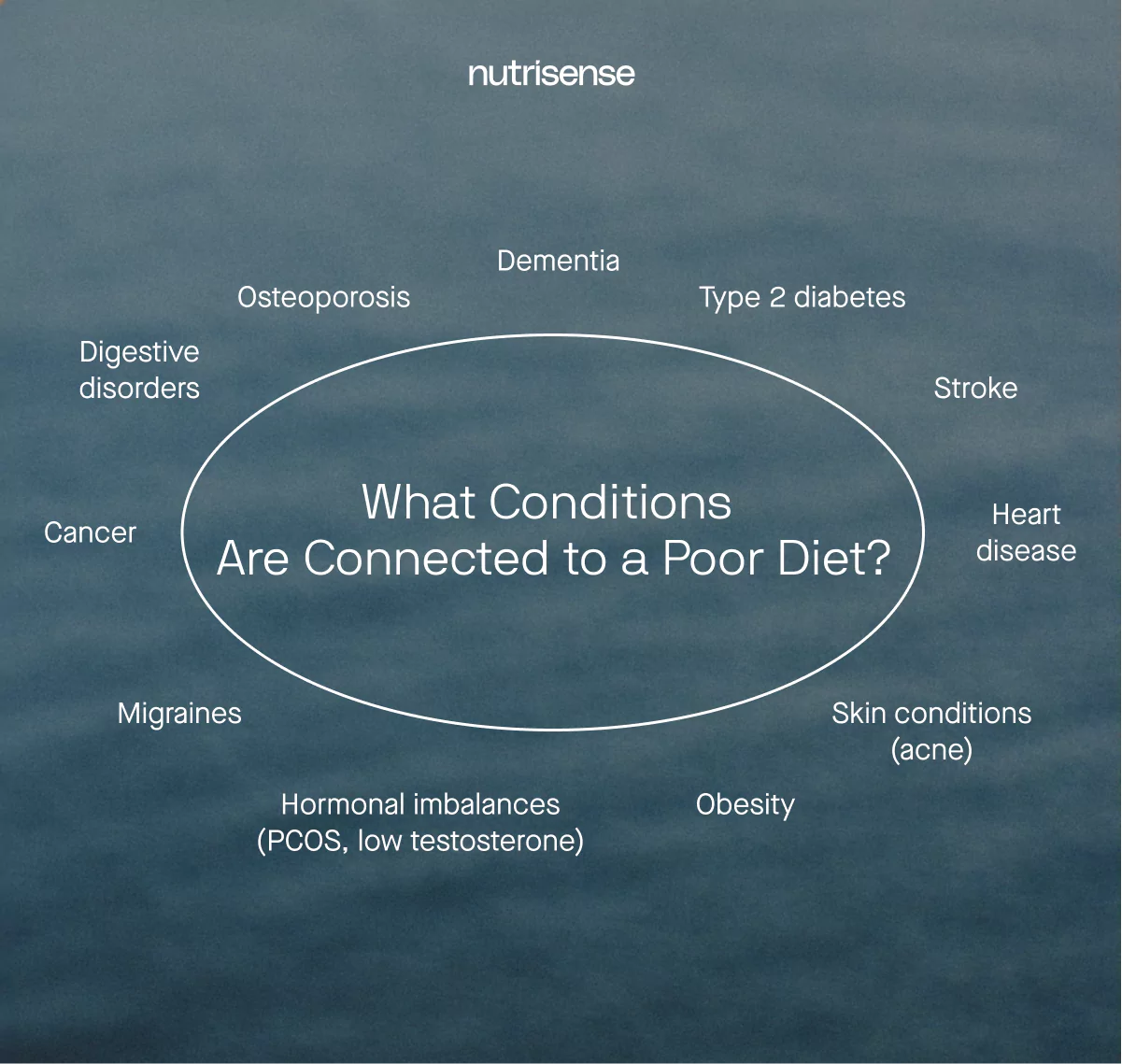
- Dementia
- Obesity
- Heart disease
- Skin conditions, such as acne
- Stroke
- Type 2 diabetes
- Digestive disorders such as IBS, IBD, and others
- A variety of hormonal imbalances, such as PCOS, low testosterone, and others
- Osteoporosis
- Migraines
- Cancer
Here are some of the main benefits of working with a certified nutritionist or registered dietitian.
Nutritional Assessment
If you are feeling overwhelmed by all of the nutrition advice you find floating around on the internet and are unsure of the scientific credibility behind it, having a personal, highly qualified nutrition professional in your corner can be a true relief.
Additionally, having someone to help you personalize and customize the assessment can make the difference between trying yet another generic diet versus understanding what really works for your unique body to create a healthy eating plan.
Customized Meal Plans

Nutritional assessment is personal, and so is a meal plan. Generic nutrition information only gets you so far–and what works for one person may not work for another.
Having a qualified nutritionist in your corner means that you can better understand what works and what doesn’t, tailoring your approach. If you want to find the right approach to weight loss, supporting hormone balance, improving energy, getting better quality sleep, and reducing your risk for chronic disease over time, customization is key.
Your family and personal medical history, symptoms, and needs are unique, and your meal plan should reflect that.
Assess Disease Risks
How are your current diet and lifestyle choices impacting your risk factors for disease over time? Instead of sorting through complex research on your own, teaming up with a qualified nutritionist, such as a registered dietitian or certified nutrition specialist, can save you the hassle.
It’s their job to know the research inside and out and to provide evidence-based education and insights. They can then recommend a diet based on your individual lifestyle.
Connect Your Symptoms

Are you struggling with fatigue? Poor sleep? Digestive problems? Mood swings? All of these symptoms and more can have close ties to what and how you are eating.
But interpreting your symptom patterns and connecting the dots to behavioral (including diet) triggers isn’t always easy. Working one-on-one with a qualified nutritionist can allow you to save time on the guesswork and cut to the chase.
You can also learn how to set up customized experiments to gain deeper insights into what works best for your body.
Stay Accountable and Motivated
Behavior change can feel hard sometimes. This includes making changes to your diet. It might also feel challenging to stay consistent and motivated over time with all of life’s ups and downs.
Your personal nutrition expert is there to not only help you stay accountable, but to give you pro tips to troubleshoot the bumps in the road and stay on track long-term.
Nutrisense Nutritionists and Dietitians
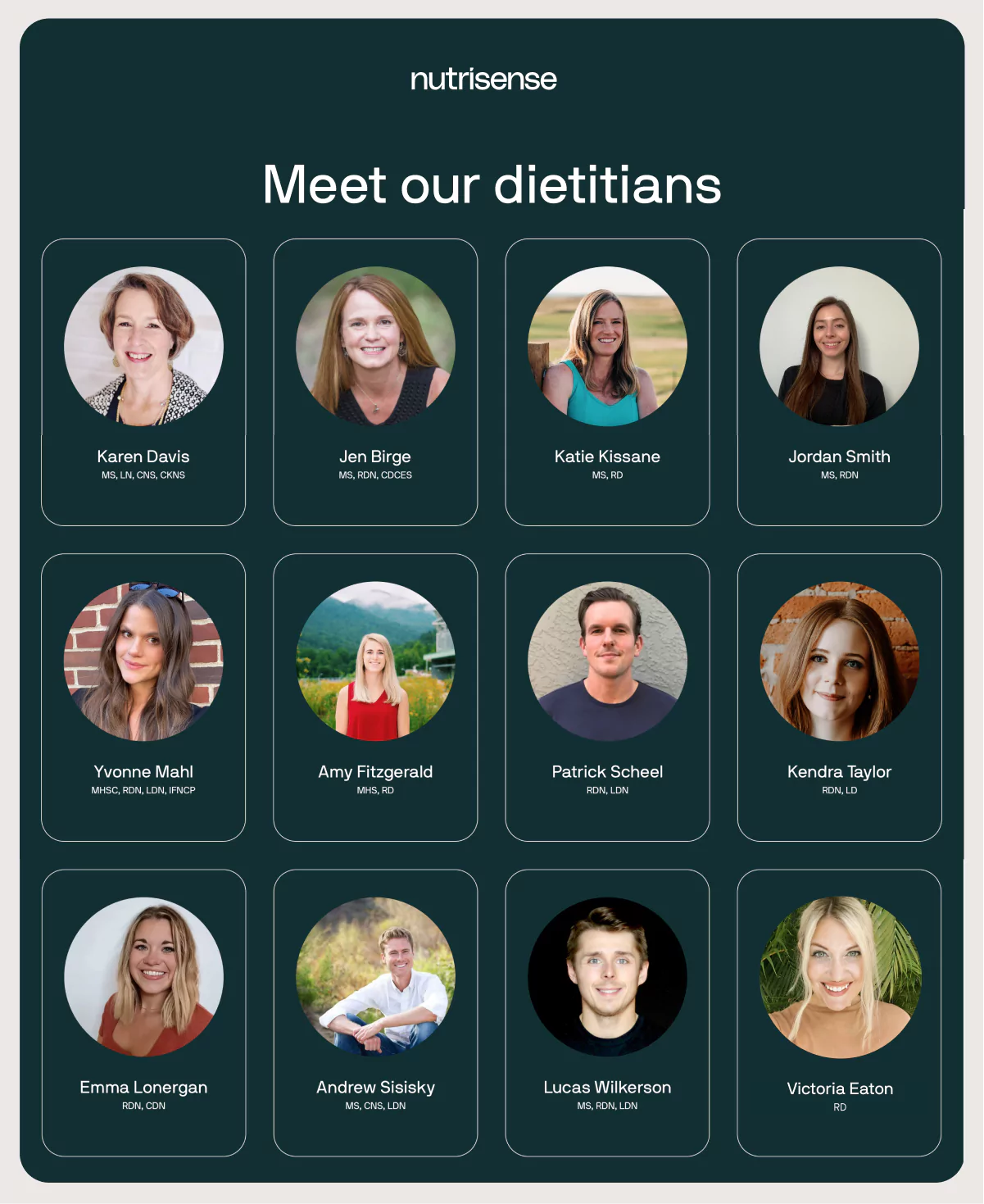
All of us at Nutrisense are firm believers in the power of one-on-one support from a qualified nutritionist. Our nutrition experts are all either registered dietitians or certified nutrition specialists. Everyone on the team has advanced training, specific specializations (like the CDCES), years of experience averaging six years, and various interests ranging across functional nutrition, lifestyle, chronic conditions, and metabolic health.
Our nutrition team coaches thousands of members on their personal health journey, and they understand that each person is unique. Check out what one member had to say about our personalized nutrition support and get started with us today!
Find the right Nutrisense programto turn insight into progress.
FAQs about Choosing and Working With a Nutritionist
Q1. How do I verify a nutritionist's credentials before booking?
A1. When possible, choose a registered dietitian RD or a certified nutrition specialist CNS. Review profiles for degree, credential, and years of practice. Nutrisense lists each team member's credentials and specializations so you can pick a good fit. If licensing is required in your state, confirm status with your state board site.
Source: Our Nutritionists
Q2. What happens in a first session with a registered dietitian or certified nutrition specialist?
A2. Expect a structured conversation focused on your goals, current habits, and priorities. Nutrisense dietitians use the C.A.R.E. approach: Connect, Analyze, Reflect, Empower, to review your data and history, then set clear next steps that fit your life. You will leave with 1 to 3 actions and a follow-up plan.
Source: Nutritionist video calls
Q3. Can a nutritionist diagnose or treat medical conditions?
A3. For diagnosis or treatment, see your healthcare provider. Nutrisense offers lifestyle coaching and education only. The service does not diagnose, cure, mitigate, prevent, or treat disease. If you need medical nutrition therapy for a condition, ask your clinician about appropriate referrals and coverage.
Source: Terms of Service
Q4. Do I need a glucose biosensor to work with a nutritionist at Nutrisense?
A4. No. You can book 1:1 video sessions with a registered dietitian through Nutrisense without using sensors. Some members pair coaching with app data from compatible sensors to explore patterns, but that is optional. You can check insurance eligibility and book directly online.
Source: Nutritionist video calls
Q5. How do dietitians use continuous glucose data during coaching?
A5. Dietitians review glucose measured in interstitial fluid to see 24/7 patterns after meals, exercise, sleep, and stress. They identify trends and suggest simple experiments such as meal timing or macronutrient tweaks, then monitor changes over time. This supports personalized recommendations based on your day-to-day routine.
Source: What is a CGM
Go Beyond Glucose Data with Nutrisense
Your glucose can significantly impact how your body feels and functions. That’s why stable levels are an important factor in supporting overall wellbeing. But viewing glucose isn't enough. Nutrisense, you’ll be able to learn how to use your body's data to make informed lifestyle choices that support healthy living.
One-to-one coaching
Sign up to access insurance-covered video calls to work with a glucose expert: a personal registered dietitian or certified nutritionist who will help tailor your lifestyle and diet to your goals.
Monitor and measure what matters
With the Nutrisense CGM Program, you can monitor your glucose with health tech like glucose biosensors and continuous glucose monitor (CGM)s, and analyze the trends over time with the Nutrisense App. This will help you make the most informed choices about the foods you consume and their impact on your health.
Find your best fit
Ready to take the first step? Start with our quiz to find the right Nutrisense program to help you take control.
Go Beyond Glucose Data with Nutrisense
Your glucose can significantly impact how your body feels and functions. That’s why stable levels are an important factor in supporting overall wellbeing. But viewing glucose isn't enough. With Nutrisense, you’ll be able to learn how to use your body's data to make informed lifestyle choices that support healthy living.
Get 1:1 Support and 24/7 Insights
Sign up to access insurance-covered video calls with a glucose expert: a personal registered dietitian or certified nutritionist who will help tailor your lifestyle and diet to your goals.
With the Nutrisense program, you can monitor your glucose with health tech like glucose biosensors and continuous glucose monitors (CGMs), and analyze the trends over time with the Nutrisense App. This will help you make the most informed choices about the foods you consume and their impact on your health.
Start With Our Quiz
Ready to take the first step? Take our quiz to find the right Nutrisense program to help you take control.

Jordyn has a bachelor’s degree in biology, a graduate degree in Human Nutrition and completed a dietetic internship at the Memphis VA. She's a dietitian at Nutrisense, and has experience working as a clinical dietitian at a VA medical center specializing in oncology and at the Mayo Clinic, working with a wide range of patients ranging from neonates in the NICU to adult ICU.

.webp)

.webp)
